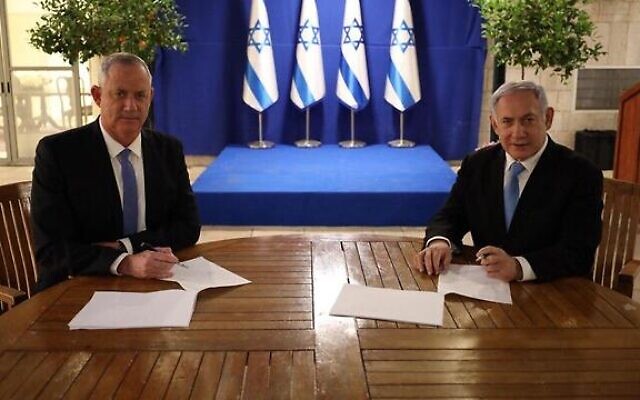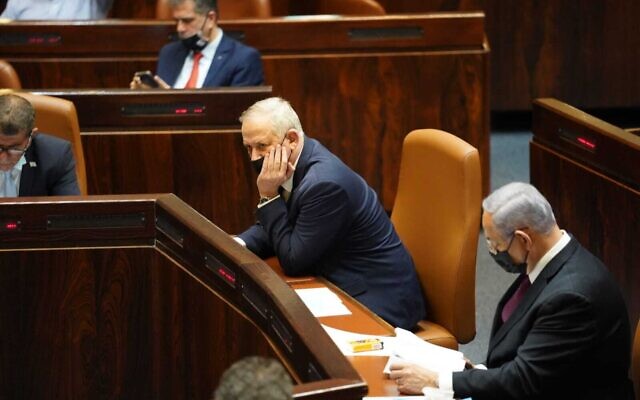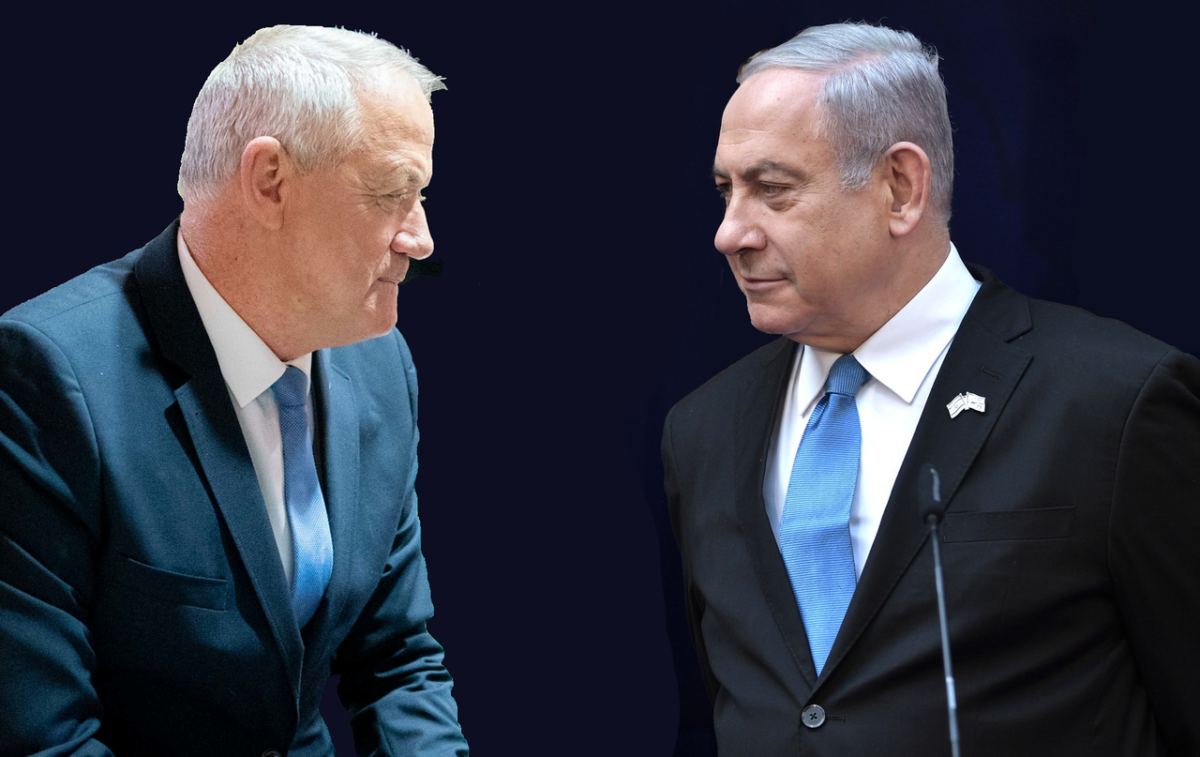It was a short-lived, shaky marriage of convenience both sides disliked yet endured until they could no longer stomach it.
Prime Minister Benjamin Netanyahu’s expedient partnership with Benny Gantz collapsed on December 22 after seven months of mutual distrust and constant backstabbing and infighting.
With the collapse of their national unity government, Israel was propelled into its fourth general election in two years. It will occur on March 23, amid a lingering coronavirus pandemic which has devastated the economy and killed 3,150 Israelis. The current government will remain in place until a new one is formed after March.
Netanyahu, the longest serving premier in Israeli history, triggered the election after failing to present a 2020 budget before the legal deadline of December 23. Netanyahu was thus in violation of his coalition agreement with Gantz, the leader of the centrist Blue and White Party and the minister of defence.
Under their pact, Gantz was scheduled to replace Netanyahu as prime minister next November, provided a budget was passed. Netanyahu exploited a loophole in their deal by creating a crisis over this provision, claiming the passage of a new budget would have to be delayed due to the pandemic.

Seven months ago, Netanyahu pledged he would honor his commitment to share power with Gantz. “There won’t be tricks and there won’t be shticks,” he said.
Another issue that led to the dissolution of the government turned on the question of whether Netanyahu has a right to choose a new attorney general and state attorney, both of whom would be deeply involved in Netanyahu’s corruption trial, which is set to resume early next year.
Netanyahu, who has been indicted on charges of bribery, fraud and breach of trust, pointed a finger of blame at Gantz. “I didn’t want elections,” he said. “We voted time after time against elections. ”
Gantz blamed Netanyahu. “A criminal defendant with three indictments is dragging the country to a fourth election,” his party contended in a tweet. “If there was no trial, there would be a budget and no elections.”

According to this theory, Netanyahu sought a new election in the hope of forming a government that would provide him with a measure of immunity from the prospect of conviction and imprisonment. “Netanyahu’s goal is to remain in power throughout his trial,” Yohanan Plesner, president of the Israel Democracy Institute, said yesterday.

Netanyahu and Gantz, the former chief of staff of the armed forces, established a government after three inconclusive elections in which neither side was able to muster a majority in the 120-seat Knesset.
Gantz promised his supporters he would never join forces with an indicted prime minister, but changed his mind after Israel was plunged into its first lockdown to combat the pandemic.
Their coalition was a rickety affair from the outset. Netanyahu did not act collaboratively, keeping Gantz out of the loop on major foreign policy issues pertaining to normalization agreements with the United Arab Emirates, Bahrain and Sudan.
Gantz, for his part, did not explicitly support Netanyahu’s scheme to annex the Jordan Valley, a plan he eventually suspended in August.
Tensions broke out again last month when Gantz, much to Netanyahu’s anger, announced he had formed a committee to investigate the so-called submarine affair, which revolves around allegations of bribery in Israel’s purchase of German naval vessels. Several of Netanyahu’s associates have been ensnared in the scandal, but not the prime minister himself. Responding to Gantz’s maneuver, Netanyahu accused him of using the Israel Defence Forces for political capital.
Earlier this month, Gantz attacked Netanyahu’s character, describing him as “a schemer and liar” and threatening to bolt the coalition. As he put it, “Either there will be a budget and a functioning government, or we’ll go to elections. I’m done believing Netanyahu.”
Although Netanyahu sought an election, he hoped it would be take place much later in the year, when the vaccination campaign was well in hand, the coronavirus contagion was on the wane, and the economy was bouncing back from two lockdowns, which have caused a massive spike in unemployment.
Still, Netanyahu is outwardly confident he will win. “The majority of the citizens of Israel see our leadership and our tremendous achievements,” he said after the Knesset dissolved itself yesterday. “We are bringing in millions of vaccinations, delivering historic peace agreements, curbing the Iranian threat, and turning Israel into one of the world’s leading economies.”
These claims notwithstanding, Netanyahu faces a major problem as he strives for yet another term of office. For the first time since his reelection in 2009, a rival on the right of the political spectrum, rather than a centrist, could well deny him and his allies in the national religious camp — Shas and United Torah Judaism — a Knesset majority.

Gideon Saar, a former Likud Party colleague and ex-cabinet minister who challenged his leadership last year, has formed the New Hope Party, which is expected to win upwards of 20 seats in the next election. Saar, who has positioned himself to the right of Netanyahu in terms of the unresolved Palestinian issue, has said that he has fostered “a cult of personality,” and that the Likud has become a “tool” for his “personal interests.”
Since Saar’s announcement, four Likud members of parliament — Ze’ev Elkin, Sharren Haskel, Yifat Shasha-Biton and Michal Shir — and two Derech Eretz faction MKs, Yoaz Hendel and Zvi Hauser, have joined the New Hope Party.

Elkin, a cabinet minister and a confidant of Netanyahu, said he had lost faith in him. In the past two years, he claimed, “personal considerations” have been the driving factor in Netanyahu’s decisions. “As someone who is watching this dangerous process from up close, I see how his personal considerations are getting mixed up with national considerations,” he said.
The Likud is forecast to garner up to 28 seats, down from 36 in the current Knesset. Gantz, having alienated a good proportion of his constituents by having joined Netanyahu, might win five seats, compared to 33 in the last election. In the worst case scenario, his party may be wiped out of existence.
Judging by the most recent survey, the third-largest party after the Likud and New Hope would be Yair Lapid’s centrist Yesh Atid-Telem Party. It could capture 16 seats.
Naftali Bennett, the former minister of defence and the leader of the far right-wing Yamina Party, could pick up 15 seats. He has indicated he will challenge Netanyahu for the premiership. “The time has come for change,” he said. Even if Bennett switches course and throws his support behind Likud, Netanyahu and his allies would acquire up to 58 seats, three short of a majority.
The Arab Joint List, Israel Beytenu and Meretz are expected to win eleven, seven and five seats respectively.

In a stunning reversal of fortune, the Labor Party, which ruled Israel for the first three decades, will probably not win even a single seat. Its leader, Amir Peretz, has resigned and may be a contender for the presidency after Reuven Rivlin’s term expires.
The wild card may be Gadi Eisenkot, the former chief of staff of the Israel Defence Forces. He is considering forming a right-of-center party and, perhaps, joining Saar. If this happens, Netanyahu’s days as prime minister may be numbered.
Netanyahu is a survivor par excellence, but the stars may not align for him in the forthcoming election.
